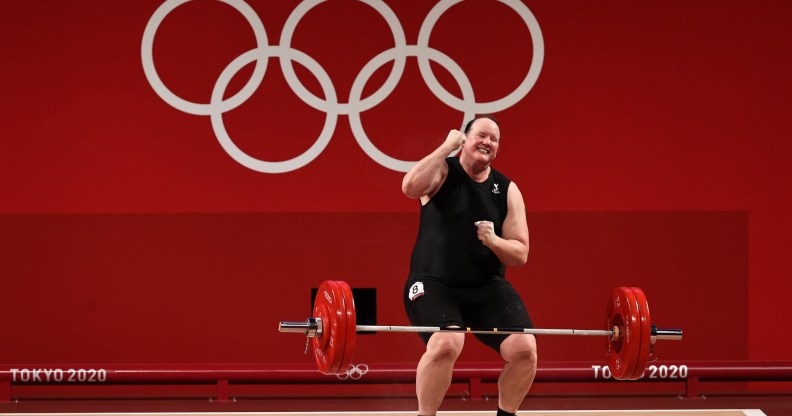Are transgender athletes allowed in the Olympics? The truth behind the myths

Weightlifter Laurel Hubbard was the first openly trans athlete to compete at the Olympic Games. (Chris Graythen/Getty Images)
Weightlifter Laurel Hubbard was the first openly trans athlete to compete at the Olympic Games. (Chris Graythen/Getty Images)
Are transgender athletes allowed in the Olympics? With Paris 2024 soon approaching, many people have been asking that question.
Unfortunately, recent years have seen transgender athletes competing in sporting events face increasingly extreme restrictions.
While transgender athletes are technically allowed in the Olympics, they’re not exactly given a warm welcome given the increasingly demanding requirements placed on them.
Ahead of the Paris 2024 Olympic games, the topic of trans athletes’ participation is once again being raised. The forthcoming Olympic games are set to introduce further restrictions to previous editions.
Can trans athletes compete at the Olympics?
The International Olympic Committee (IOC) currently allows the governing bodies of individual sports to set their own rules around the inclusion of trans athletes.
It updated its guidelines in 2022 to read: “Principle 4 [fairness] recognises that sports organisations may at times need to issue eligibility criteria for sex-segregated competition to maintain a fair and proportionate distribution of competitive advantages among participants.
“It also recognises the particular importance of advancing equality for women in sport and preserving fair and meaningful competition for elite women athletes, which may require criteria that limit eligibility in some cases.”
There are examples of transgender athletes at the Olympics. At the Tokyo 2020 Olympics, New Zealand weightlifter Laurel Hubbard made history as the first openly trans athlete to compete at the Olympic Games.
Now, athletes like Hubbard who have previously represented their nation at the Olympics will not be eligible for the Paris 2024 Games.
Previously, the IOC had guidelines in place that allowed trans women athletes to compete if their testosterone levels were below 10 nanomoles per litre a year before competing.
However, this rule led to even cisgender women being banned from female sporting events because of naturally high testosterone levels.
Various further bans have also been enacted against trans athletes recently in a number of sporting groups.

Are there restrictions on trans people in professional sports?
Last March, the governing body of athletics (World Athletics Council) banned women from competing in elite female competitions if they have gone through male puberty.
At the time, World Athletics president Sebastian Coe said the tightening restrictions to exclude transgender women was due to the “overarching need to protect the female category.”
The decision was enacted on 31 March, Transgender Day of Visibility.
Unfortunately, similar attitudes were then adopted by World Aquatics in its ‘Gender Inclusion Policy’.
The governing body voted to bar trans women from competing in women’s swimming events if they had gone through any part of puberty.
Swimmer Lia Thomas has now filed a legal dispute against World Aquatics’ anti-trans policies, citing a number of decisions from the governing body disqualifying most trans women and intersex athletes from international events.
The International Cycling Union (UCI) has also introduced bans on trans women participating if they have reached puberty before transitioning.
Such restrictions are introduced with the attempted justification of ‘safeguarding’ women’s sport.
These trans bans have reached every corner of the sporting world: professional golfer Hailey Davidson was pushed into testosterone testing to verify her eligibility after she won a women’s pro tournament in Florida.

